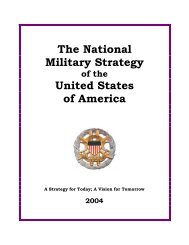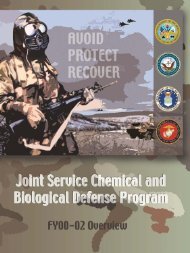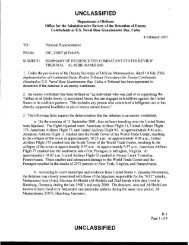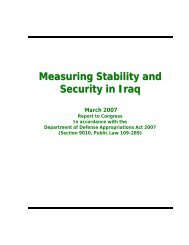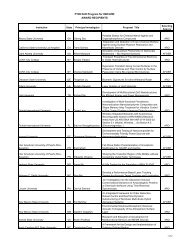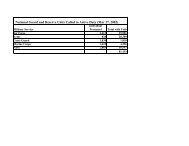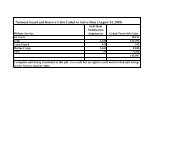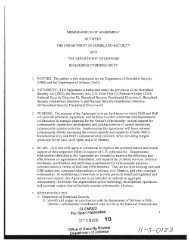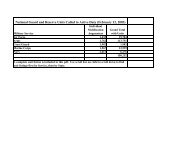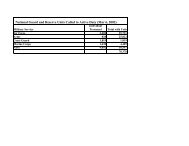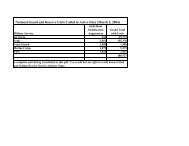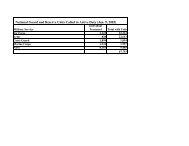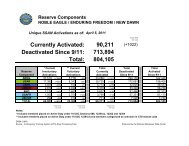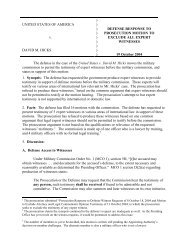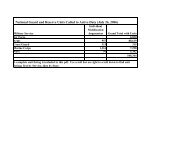Report - United States Department of Defense
Report - United States Department of Defense
Report - United States Department of Defense
You also want an ePaper? Increase the reach of your titles
YUMPU automatically turns print PDFs into web optimized ePapers that Google loves.
UNCLASSIFIED<br />
budget rose from 39 percent in 2010 to about 52 percent in 2012. Under the TMAF, GIRoA is<br />
expected to improve its budget execution rate to 75 percent by 2017. Considering the 50/80<br />
declaration from the Tokyo Conference (50 percent <strong>of</strong> donor funding to be “on-budget” and 80<br />
percent <strong>of</strong> donor funding aligned with approved National Priority Programs), the noted budget<br />
execution goal for the Afghan government could prove challenging.<br />
Constrained public financial management capacity remains one <strong>of</strong> the difficult challenges that<br />
hinder public-sector program implementation and public service delivery. Specifically, GIRoA<br />
cites capacity constraints at the national and sub-national levels; weak planning and budget<br />
formulation; donor earmarking <strong>of</strong> funds and funding delays; and communication challenges<br />
across ministries, donors, and sub-national entities as key challenges.<br />
3.4: RULE OF LAW<br />
The <strong>United</strong> <strong>States</strong> and coalition partners conduct a broad range <strong>of</strong> programs that promote the rule<br />
<strong>of</strong> law (RoL) in Afghanistan. DoD’s RoL efforts include field support to civilian RoL teams;<br />
training for judges, prosecutors, defense counsels, and corrections <strong>of</strong>ficials; providing necessary<br />
infrastructure for courts and prisons; and training MoI police forces in aspects <strong>of</strong> law<br />
enforcement, from investigations to community policing. However, RoL continues to be one <strong>of</strong><br />
GIRoA’s weakest areas, where progress remains difficult to see.<br />
USAID’s RoL program has three main components: building the capacity <strong>of</strong> the formal justice<br />
and traditional dispute-resolution systems; promoting governmental and civil society anticorruption<br />
measures, and promoting human rights. The RoL portfolio has both national and subnational<br />
impact, and promotes RoL institutionally and at the grassroots level.<br />
The <strong>Department</strong> <strong>of</strong> State (DOS) funds projects focused on six lines <strong>of</strong> effort: formal justice<br />
sector capacity building; corrections reform; major crimes; legal education; civil society and<br />
access to justice; and gender justice. Other agencies, such as the <strong>Department</strong> <strong>of</strong> Justice,<br />
Treasury, and Commerce, provide subject matter experts to advise and train key members <strong>of</strong><br />
Afghanistan’s justice system.<br />
The RoL mission is shared among several military and civilian RoL actors, including USAID<br />
and the entities within the DOS focused on rule <strong>of</strong> law. Military actors include the U.S. Forces-<br />
Afghanistan’s Rule <strong>of</strong> Law Field Force – Afghanistan (ROLFF-A), as well as the NATO<br />
companion military force, the NATO Rule <strong>of</strong> Law Field Support Mission Afghanistan<br />
(NROLFSM-A); International Security Assistance Force (ISAF) coalition partners, ISAF<br />
Regional Commands, and NTM-A. Civilian actors include the USG; coalition civilians working<br />
in the Provincial Reconstruction Teams (PRTs); the <strong>United</strong> Nations Assistance Mission<br />
Afghanistan (UNAMA), including the <strong>United</strong> Nations’ agencies in Afghanistan; the World<br />
Bank; donor countries; NGOs; GIRoA; Afghan civil society; and other justice <strong>of</strong>ficials.<br />
Although NATO policy authorizes UNAMA to take the lead on civilian governance and RoL<br />
issues, its capacity to lead and execute programs is limited.<br />
The Rule <strong>of</strong> Law Field Force—Afghanistan (ROLFF-A) was established to unite USFOR-A and<br />
U.S. Embassy efforts, ensuring a more unified approach to civilian-military RoL efforts.<br />
134



